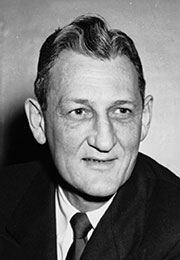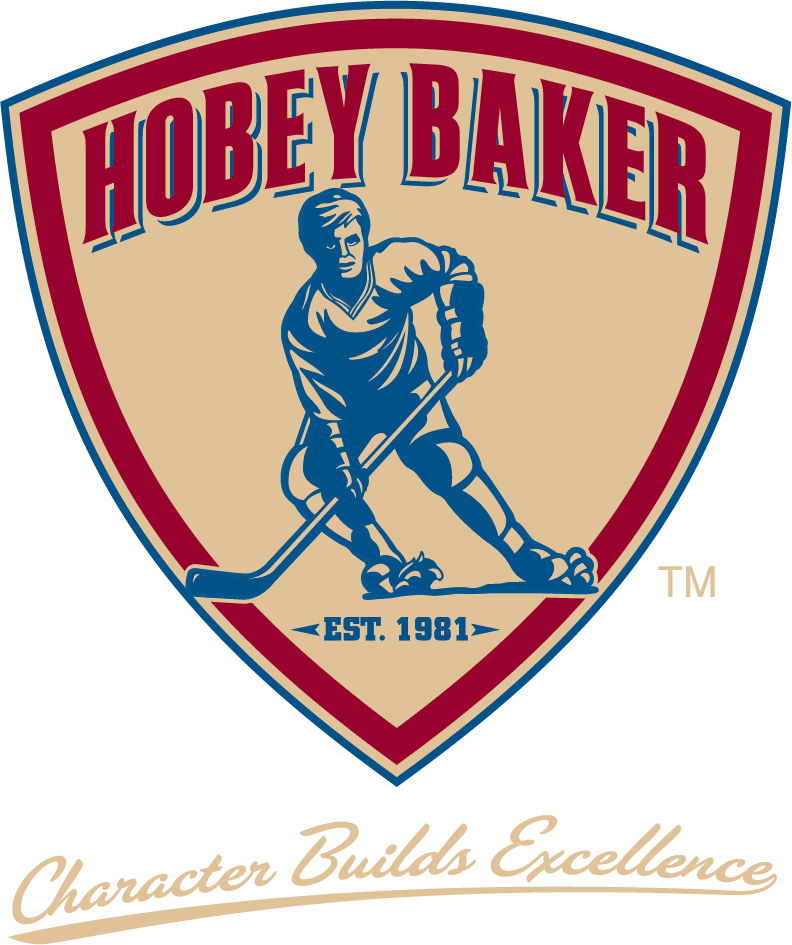Ralph “Cooney” Weiland – 2006 Legend of College Hockey

Few hockey mortals have ever accomplished what Ralph “Cooney” Wieland amassed in nearly fifty years involved in the great game of hockey. At the collegiate level, he is remembered as the twenty-one year head coach of Harvard University and a key influence on numerous All Americans. Prior to his college days, Cooney rewrote the NHL record book and helped the Boston Bruins to three Stanley Cup championships.
As the recipient of the 2007 Hobey Baker Legends of Hockey award, Ed Saugestad was recognized for his lengthy and outstanding service to college hockey at the Hobey Baker Memorial Award Banquet on May 3, 2007 in St. Paul. Saugestad was honored along with 2007 Hobey Baker Award winner Ryan Duncan.
In a phenomenal career that spanned parts of five decades and 37 seasons from 1958 to 1996, Saugestad recorded over 500 career wins (503-354-21). Among his many accomplishments, Saugestad guided the Buggies to three NAIA national titles and six Minnesota Intercollegiate Athletic Conference (MIAC) titles.
During the 1970s and early 1980s, Augsburg was a national power making 10 post-season appearances in 12 years from 1971 to 1982 (nine NAIA and one NCAA Division III). From 1975 to 1982, Augsburg had a glorious run of eight straight national tournament berths, earning national championships in 1978, 1981 and 1982.
Following each of those championship seasons, the always-jovial Saugestad was named NAIA National Coach of the Year. He was also named MIAC Coach of the Year six times and coached 22 All-Americans at Augsburg.
In the ultimate honor, the MIAC’s playoff championship trophy was christened as the Ed Saugestad Trophy in 1998. Fittingly, the first team to win the Saugestad Trophy was Augsburg during the 1997-98 season.
Saugestad began his illustrious career while still a student at Augsburg in 1958, graduating with a double major in physical education and biology in 1959, adding a master’s degree from the University of Minnesota in 1964. In addition to coaching hockey, Ed also served as an Augsburg football coach from 1959-1984 including head coach in the 1970 and 1971 seasons. Ed served as men’s athletic director from 1981-1987, and during his entire career at Augsburg, he was an instructor in the school’s Health and Physical Education department.
Ed was honored by the American Hockey Coaches Association with the John MacInnes Award in 2002 for his contributions to the growth of amateur hockey in the U.S. Winners of this award have helped young people grow not only as hockey players, but more importantly as individuals. And in a unique tribute from his home state, February 17, 1996 was declared Ed Saugestad Day by the State of Minnesota.
A native of Searforth, Ontario, Wieland completed his junior hockey career becoming property of Boston. His lengthy career in the sport commenced with a three-year stint in Minnesota with the Minneapolis Millers beginning in 1925. While learning the ropes as an NHL rookie with the Bruins in 1928-29, Wieland centered the “Dynamite Line” with Dit Clapper and Dutch Gainor as his wings. The trio blossomed immediately and Cooney quickly became known as one of the slickest players of his era tormenting defenses with his trickery. Wieland scored a respectable 11 goals in the regular season and contributed to the first Stanley Cup win in franchise history.
The next year the league relaxed its forward-passing rules, and the changes were tailor-made for the Dynamite trio. Wieland registered an astounding 43 goals in 44 games, while linemate Dit Clapper scored 41 more. Not only did Wieland lead the league in goal- scoring, he also won the points title with 73, shattering Hall of Famer Howie Morenz’s single-season record of 51 points.
The Bruins dominated the NHL with a record of 38-5-1, including a streak of 14 consecutive regular-season victories that wasn’t bettered until the New York Islanders strung together 15 wins in 1982. But their bid to repeat as Cup champs was blocked by the surprising Montreal Canadiens, who swept the best-of-three finals.
The Dynamite Line was broken up in 1932 when Wieland was traded to the Ottawa Senators because of conflicts with his coach Art Ross. He led Ottawa in scoring, but the once proud franchise was decimated by the Great Depression and owner Frank Ahearn was forced to sell Wieland to the Detroit Red Wings. There he worked with talented wingers Larry Aurie and Herbie Lewis and put up the best numbers of his career since his glory days in Boston.
Their differences apparently resolved, Ross reacquired Wieland in June 1935. He played his last four NHL seasons with the Bruins and was often teamed with Dit Clapper and Charlie Sands. After the Kraut Line rose to prominence in Beantown, Wieland became a utility forward who often played with Ray Getliffe and Mel Hill.
Wieland retired in 1939 after contributing to a second Stanley Cup championship and immediately took over the team’s coaching reins. He guided the club to another Cup in 1941. Cooney spent two seasons behind the Bruins bench then took his magic touch to the Hershey Bears where he spent the next five seasons coaching in the minors.
Then, it was on to Harvard for the 1950 season where Cooney found his home, calling the shots for the Crimson until his retirement in 1971, becoming the longest tenured head coach in team history. As head coach, Wieland led the Crimson to six Ivy League championships, five NCAA tournament appearances, five Beanpot titles and two ECAC championships.
Twice he was named coach of the year by the American Hockey Coaches Association, first in 1955, when he led the Crimson to third place in the NCAA tournament, and again in his final season, when his team captured the ECAC tournament. The New England Hockey Writers Association named Wieland its coach of the year five times and honored him with the Schaefer Pen Award for contribution to amateur hockey in 1962. He received the Lester Patrick Award for contribution to hockey in the United States in 1972.
Wieland coached seven All-Americans, including three-time first-team selection Joe Cavanagh (’71) and two-time pick David Johnston (’63). His players earned a total of 26 first team All-Ivy honors, highlighted by the 1956-57 team, which was comprised entirely of Crimson players.
Four of Wieland’s Harvard players helped the 1960 U.S. Olympic team win the gold medal in Squaw Valley. Among that group was the legendary Bill Cleary (’56), who went on to assist Wieland and succeed him as head coach. Cleary served in that role for 19 seasons and as athletic director for 11, earning the Hobey Baker Legend of College Hockey Award in 1993.
Wieland was born Nov. 5, 1904 and died July 3, 1985. Current Harvard Univ. head coach Ted Donato will accept the recognition of Hobey Baker Legend of Hockey posthumously for Wieland.
